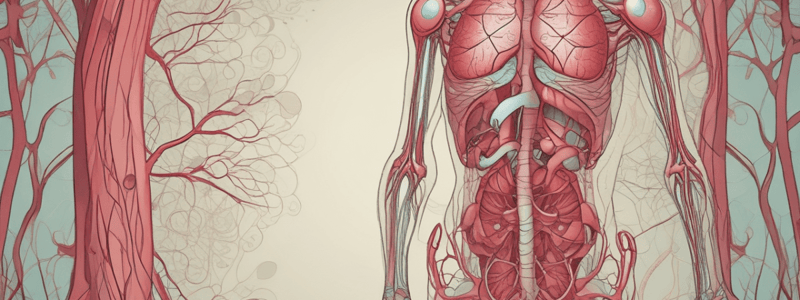Podcast
Questions and Answers
What is the primary function of arteries in the circulatory system?
What is the primary function of arteries in the circulatory system?
- To regulate blood pressure
- To carry oxygenated blood away from the heart (correct)
- To carry blood towards the heart
- To exchange oxygen with the cells
What is the exception to the general rule that arteries carry oxygenated blood and veins carry deoxygenated blood?
What is the exception to the general rule that arteries carry oxygenated blood and veins carry deoxygenated blood?
- The vena cava
- The pulmonary artery (correct)
- The capillaries
- The aorta
Why do veins appear blue in diagrams, despite carrying deoxygenated blood?
Why do veins appear blue in diagrams, despite carrying deoxygenated blood?
- Because deoxygenated blood is blue
- Because of the optics of light passing through the skin (correct)
- Because veins are depicted as blue in diagrams
- Because oxygenated blood is red
What is the purpose of valves in veins?
What is the purpose of valves in veins?
What percentage of the total blood volume is found in arteries?
What percentage of the total blood volume is found in arteries?
What is the primary difference in pressure between arteries and veins?
What is the primary difference in pressure between arteries and veins?
What is the purpose of the pulmonary artery in the circulatory system?
What is the purpose of the pulmonary artery in the circulatory system?
What is the purpose of the capillaries in the circulatory system?
What is the purpose of the capillaries in the circulatory system?
What is the percentage of the total blood volume found in veins?
What is the percentage of the total blood volume found in veins?
Study Notes
Arteries and Veins
- Arteries carry blood away from the heart, while veins carry blood towards the heart.
- This definition is not always accurate, as there is an exception in the case of the pulmonary artery, which carries deoxygenated blood away from the heart to the lungs.
- Arteries are often depicted as red in diagrams, while veins are depicted as blue, but this does not necessarily represent the oxygen content of the blood.
- Deoxygenated blood is not blue, but rather a deeper red, and the blue color seen in veins is due to the optics of light passing through the skin.
Blood Circulation
- Oxygenated blood is pumped away from the heart through the aorta and into the arteries.
- The arteries branch into smaller vessels, eventually forming capillaries, where oxygen is exchanged with the cells.
- The deoxygenated blood then returns to the heart through the veins.
- The pulmonary artery is an exception, carrying deoxygenated blood away from the heart to the lungs, where it becomes oxygenated again.
- The oxygenated blood then returns to the heart through the pulmonary veins.
Characteristics of Arteries and Veins
- Arteries have high pressure due to being directly pumped by the heart.
- Veins have low pressure, as the blood is not directly pumped and flows sluggishly back to the heart.
- Arteries are low volume, while veins are high volume, with approximately 15% of the total blood volume in arteries and 65% in veins.
- Valves in veins ensure that blood flows in one direction, despite the low pressure.
Arteries and Veins
- Arteries carry blood away from the heart, while veins carry blood towards the heart, except for the pulmonary artery.
- The pulmonary artery carries deoxygenated blood away from the heart to the lungs.
Blood Circulation
- Oxygenated blood is pumped away from the heart through the aorta.
- Arteries branch into smaller vessels, eventually forming capillaries, where oxygen is exchanged with cells.
- Deoxygenated blood returns to the heart through veins.
- The pulmonary artery is an exception, carrying deoxygenated blood to the lungs, where it becomes oxygenated again.
- Oxygenated blood returns to the heart through the pulmonary veins.
Characteristics of Arteries and Veins
- Arteries have high pressure due to direct pumping by the heart.
- Veins have low pressure, with blood flowing sluggishly back to the heart.
- Arteries are low volume, containing approximately 15% of total blood volume.
- Veins are high volume, containing approximately 65% of total blood volume.
- Valves in veins ensure one-directional blood flow despite low pressure.
Studying That Suits You
Use AI to generate personalized quizzes and flashcards to suit your learning preferences.
Description
Learn about the differences between arteries and veins, including their roles in blood circulation and exceptions to the rule.




